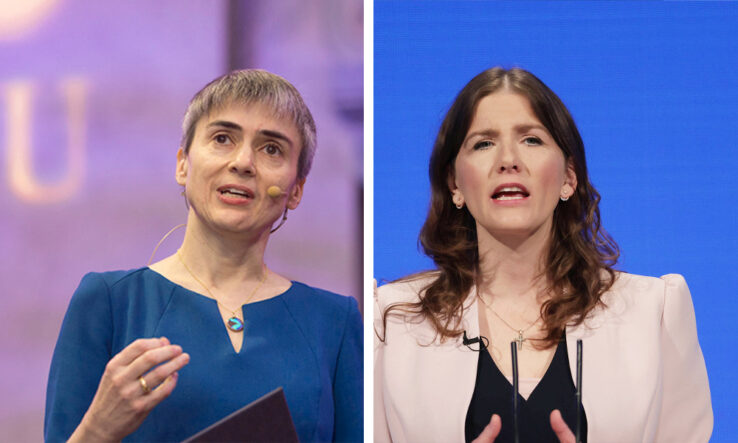
Image: NTNU [CC BY-SA 2.0]; The Conservative Party [CC BY 2.0], via Flickr
Top appointment’s timing looks like a Conservative grab for post-election power, says William Cullerne Bown
In September 2019, Mark Walport announced he was stepping down from his job as the first chief executive of UK Research and Innovation. That gave the government nine months to find a successor and get them into post for June 2020.
That successor’s term is up in June 2025, so you’d expect them to announce their resignation in September 2024. But in fact Ottoline Leyser (above, left) has already signalled her departure, a full seven months earlier than Walport did.
UKRI says “it is necessary that succession planning is undertaken well ahead of the end of the fixed term for all public appointments to ensure a smooth continuation of public service”. Well, yes. But nine months really is long enough. Why the extra seven?
One possible answer is to move the appointment process forward. If this started in September, it would probably not be done until the next government was in power.
Frustrating change
With Keir Starmer odds-on to be the UK’s next prime minister, the effect is to make the top job in UK science a Conservative appointment. This could potentially saddle an incoming Labour government with a UKRI chief executive set up to frustrate any change of direction.
The Conservatives have form here. The Institute for Government (IfG) think tank has voiced concerns at the politicisation of public appointments in recent years, warning that Conservative ministers have been packing appointment panels with loyalists.
Academics will remember the decision to make James Wharton, one of Boris Johnson’s operatives, chair of the Office for Students—and to block Jonathan Michie’s appointment as executive chair of the Economic and Social Research Council.
The institute has warned that, in the run up to the election, “Ministers who fear losing their place in government may be keen to rush through appointments to entrench supporters in key roles.”
When public offices are handed to cronies, they become a vehicle for patronage rather than patriotism. The office holder is a political servant rather than a public servant. Instead of bolstering our democracy they undermine it, creating an elite that puts tribal allegiance above competence.
Patronage also opens the door for corruption. In 2021, before the pandemic-era scandals relating to purchasing of protective equipment came to light, another think tank, Chatham House, was warning that the Conservatives have a kleptocracy problem.
Leyser’s early resignation fits the pattern the IfG warned about. So does the equally premature advertisement for a replacement for Indro Mukerjee when he steps down as chief executive of Innovate UK in September.
The sorry tale that saw £15,000 of public money spent cleaning up after science minister Michelle Donelan’s mistakes followed the same pattern—it started with UKRI appointing people that the minister did not like to a public body, in this case the panel advising the next Research Excellence Framework on equality, diversity and inclusion (EDI).
Yet far from being chastened by the debacle, Donelan (above, right) is pressing on with the same agenda. And why wouldn’t she? For the Conservatives, it’s a way of staying in power after they’ve lost at the ballot box.
Despite Starmer probably being months away from becoming prime minister, the UK discussion of policy on science and technology seems trapped in a Conservative bubble. Within this bubble, sober, capable progress is steadily being made towards transforming Britain into a science superpower. The bubble is inflated every day through the DSIT press office and bears no credible resemblance to the actual trajectory the country is on.
Bubble trouble
Partly the bubble comes from the power of incumbent governments to set the agenda, but other factors are also at work. Many of the positions with the authority to contest policy have been filled with allies drawn from the Conservative elite. Others feel intimidated—the most striking feature of Donelan’s criticism of UKRI’s EDI panel was not its slander but its aggression. The media is mostly hostile to Labour. Knowing this, Labour confines itself to a small number of carefully honed messages that it repeats over and over, the better to cut through.
Within the Conservative bubble, we are being invited to hurry on past Leyser’s resignation to debate the sort of person who should replace her. But when all the signs suggest the kind of person Donelan has in mind is “one of us”, you’ll have to excuse me for not moving on.
William Cullerne Bown is the founder of Research Professional and a former adviser to Labour’s science team
This article also appeared in Research Fortnight